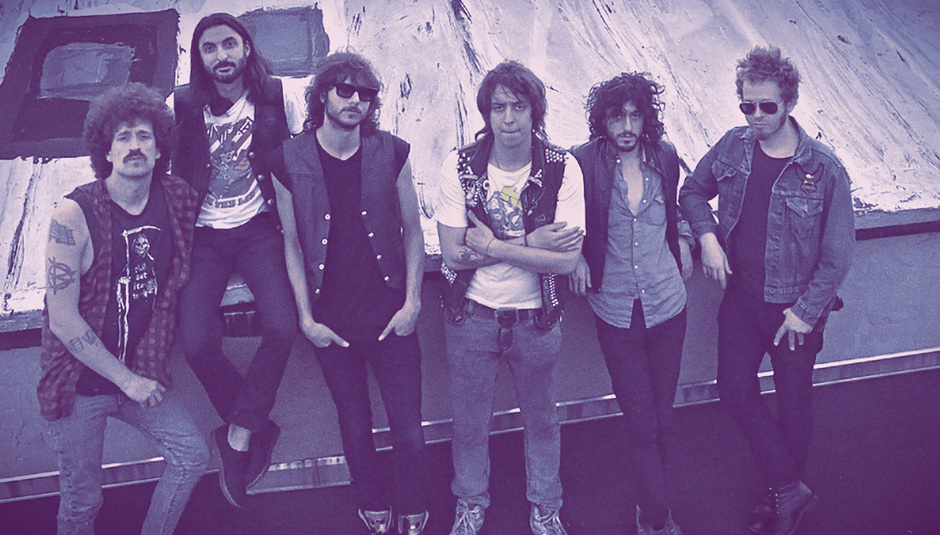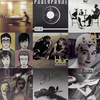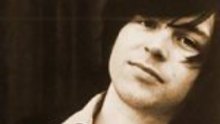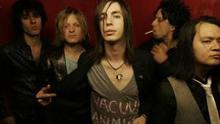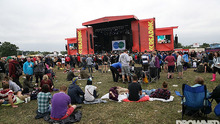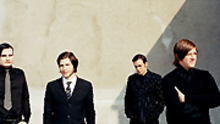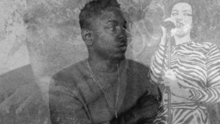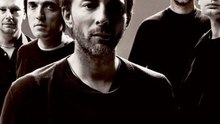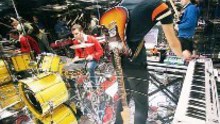We live in testing times. It’s increasingly difficult to watch the news, or flip through a broadsheet, and not feel crushed by the doom and gloom that surrounds modern current affairs. War, scandal, epidemics; there’s a sad inevitability about every new disaster, about each step that takes us further from the end of history. And while it’s easy to grumble, putting a finger on what exactly has gone wrong – or coming up with solutions – is a much trickier proposition. But Julian Casablancas, indie rock poster boy and frontman of one of the Noughties' most influential bands, thinks he knows.
“I made a list of, like, 20 things; none of them can happen. Doesn't matter what your cause is, or what you're passionate about, because of the way money runs the government. Should I just name them all?”
Leaning forward in his chair, head half-buried in his hands, he recounts in that familiar, lazy drawl what he sees as the problems facing America – by extension, the world – and what needs to change.
“Environmental laws, net neutrality, higher minimum wage – a living wage – education reform, so people understand the history of America, and the way racism has progressed. There's election reform, globalising human rights, proper food labeling, human sex trafficking, truth in politics, police brutality…”
His voice tails off, wearied by the gravity of the challenge he’s describing. He seems uncomfortable, like he can’t believe he’s the person pointing all this out, but there’s a solemnity to his voice that suggests a man who stared into the abyss and fully comprehends what he saw. I didn't expect to be having an earnest discussion about neoliberalism’s effect on politics with the man once anointed as the savior of rock’n’roll, but then Casablancas has always been adept at confounding expectations.
A well-to-do kid from a privileged background playing at being a Lower East Side waster; arrogance and nonchalance hiding a fierce work ethic (“I would prefer it if people thought I just played guitar for three minutes a week…But you work so hard, you make it sound effortless,” he told the Guardian in 2011); a trend-setting, fashionably louche rock star hiding behind crippling insecurity: Casablancas, and the group he’s fronted for fifteen years, the Strokes, have always existed in a strange dichotomy. Few bands have so defined their era, and yet been utterly beholden to it, as the Strokes have, and as the millennium’s first decade drew to a close they ground to a halt, the decline in their creative output matched by their dwindling relevance in a world that had moved on from post-millennial ennui and Seventies slacker cool.
Weighed down by the twin burdens of fame and expectation, the comedown hit Casablancas, the group’s primus inter pares, the hardest. His first solo foray, Phrazes for the Young, was a joyless, over-polished jumble of ideas that did nothing to dispel the image of a star on the wane. Sharing songwriting duties for the first time on 2011’s Angles, he literally phoned in his vocals during sessions dubbed “Operation Keep Everyone Happy”, while their increasingly unenthusiastic live appearances – Casablancas barely moving, dead-eyed and hunched – had a distinctly going-through-the-motions vibe. The youthful rebel who set the template for the New Rock Revolution and re-drew the boundaries of popular culture became a very distant memory.
Recently, Casablancas has found himself at an awkward cultural crossroads; part Rock elder Statesman, part political firebrand, and, along with new group The Voidz – a collection of friends and session musicians from LA – a daring sonic innovator not afraid to push the limits of good taste. In person, he retains the boyish charm and puppy-dog eyes that made him indie’s premier teenage heart throb, but there’s a spikiness underneath all that natural charisma, born of an uneasy relationship with the press. He invites me to sit in on an interview with a French magazine and, after making me a chicken sandwich from the sumptuous spread laid out along one wall of their dressing room, I joke that I’ll be kind to him. He shoots me a withering look. “That’s what all journalists say to your face,” he deadpans, “and then in print they slip the knife in.”
If you’re wondering why we’re even talking about politics, it’s because Casablancas has made something of a left turn and emerged as an unlikely social warrior. Tyranny, his new album, was conceived as something of a protest record, and a quick scan of the song titles – ‘Human Sadness’, ‘M.utually A.ssured D.estruction’, ‘Off To War…’ – gives a pretty good indication of his mood. Interviews around its release last September saw him talk of people “living in a Versaille bubble” and how “we have the sense that we've moved on from where the centers of wealth arbitrarily decide what is law and what wars we fight…but I don’t think we have. The system is very similar to a monarchy.”
Since Tyranny came out, things have gotten even bleaker; Ferguson, the Eric Garner killing, and the CIA torture report all seemed to reinforce his point. Does he feel vindicated?
“Told you! I warned everyone!” he jokes. “I don’t wanna keep repeating myself but I've realized it’s just the money in politics – at least in America – it’s indirectly everywhere. That controls everything. It comes down to education too, and what people learn. Right now there’s a battle going on [in America], it’s like they can’t really inform you, and the history books…the right wing, they wanna literally change history, written history.”
We talk about the prospect of change, and he’s not entirely pessimistic; he thinks people are waking up, albeit “painfully slowly”, and that “it always changes for the better, it just takes hundreds or thousands of years.” So our generation won’t get the benefit then? “The problem is that the few bad guys, or the people who are involved with them – greed makes you fight for stuff and not care about who you’re hurting – but what they've become good at is keeping people just happy enough to not revolt, you know? So it’s hard. Unless people's own stuff is being messed with, they don't seem to get angry. I guess it has to get bad before it gets good. It'd be nice if people could, even though things are going well, go: ‘Oh, wait up a second, what we're doing is really messed up.’ But that’s not very likely.”
The idea of a tipping point has been much debated in the media; some argue we’re forever on the cusp of pitchfork-wielding mobs handing out vigilante justice, others believe we’re far too obsessed with the minutiae of our own lives and being consumers to get properly angry. Spend any time online though, or arguing in bars, and you get a sense people want to be blissfully ignorant, to shut out bad news with endless cat GIFs and obsessing over reality TV. Casablancas is not so sure.
“People don't know what to do though, it's so complicated – even the politics they are following have almost nothing to do with what the problem is…”
“They're busy living their lives,” interrupts keyboardist Jeff Kite. “Most people just don't want to know or get involved because it takes effort. It takes time. And it's a slow change. But that's why you do see protests in NYC, or Ferguson – it's because their community is at risk, and that means something personally to them. That's a big deal, it's on their doorstep, so they’re gonna step outside and make themselves heard.”
Casablancas nods in agreement. I ask if it’s an age related thing too; growing up (he’s 36), settling down (he’s been married for nearly ten years, and has a four-year-old son), and maturing (he’s been teetotal since 2006) all lead to the type of soul-searching and consideration that very rarely happens in your twenties. Is youth, at least in this context, wasted on the young?
“Maybe it’s more like education is wasted on the young,” corrects guitarist Jeramy ‘Beardo’ Gritter.
“Well, it depends on what you feed them,” retorts Casablancas. “If people learned true history, we would see through so much BS. It’s like if you watch videos of people talking during the civil rights movement, the people who believed in segregation, when you hear the way they talked it sounds just like today. And they’re using arguments that are kinda convincing, even today, of the type that right wing people use. They'll be like: ‘Hey, I'm not racist, and I think everyone should be equal, but it's the constitution of America! If you own a restaurant, you can do what you want and that’s your right, even if it's wrong.’ You know? People don't have that knowledge and so they just keep falling into the same traps. And the people who are laying the traps are making sure that doesn't get into the history books….they want everyone to stay dumb, specifically. And that's just straight dope. I heard a cool quote today actually; they say that you've gotta make the world a better place for your children, but you actually have to make better children for the future world. So I think that education is a huge, huge thing.”
Gritter adds that “If I was in college now, I’d be a lot more engaged and retain a lot more information. And enjoy the learning process more...” but Casablancas is having none of it.
“But we're given such a watered down version [of history] though. If you were ten-years-old and read the People's History of the US, or the version that has Columbus coming and slaughtering people, you'd be like: ‘Woah!’ And then you'd always be aware of how people are. I watched a documentary on Cuba; what the American government did was so messed up, and yet today you'll still hear people saying ‘Cuba is bad!’ And people just don't even understand the whole thing about how it went down. They're just repeating: ‘Cuba is bad. Cuba is bad.’ It's like 1984 or something. If you had the correct history, there'd almost be no problems. But it's very hard, because if you try to teach people the People's History, you'll be attacked by all the right wing money groups as if you were some crazy liberal. PBS is the only news station that's not funded by some mega-corporation with questionable ties, and they’re trying to shut it down, as if it's left-wing garbage. And it's the only one that's actually trying to be independent! But when you are independent, you're indirectly left-wing because left and right are bought, and you know... It's a struggle. That's what I'm saying; if everyone understood that every issue meant you had to take out the secret financing, then they could start to pinpoint who the bad guys are and who’s telling the truth and who's not. But until that moment, it's all just a free-for-all of who's got the most marketing money.”
From Columbus to Cuba to Orwell to cable TV; this is how he thinks, brain whirring at a million miles an hour, thoughts tumbling out. It’s impassioned, heavy-weight stuff for someone who once sang, “I've got nothing to say” and spent a notorious Rolling Stone interview drunkenly nuzzling his (male) inquisitor. He’s clearly no intellectual slouch, but nor is he a dreamer; with an election looming in 2016 – and US politics as partisan as ever – you get the sense he’s keen to be heard, to make a difference. But these are onerous burdens to carry in one’s art, and I’m not sure he’s made peace with himself for adding to the weight on his shoulders. I figured he’d be happy with a more serious line in questioning than he’s normally subjected to, but he’s getting tired: “Please, I’m shutting down”. He shuffles his feet and stares at the floor. I change the subject. We move on.
Three hours earlier, he strolls casually onto a stage decorated with random fairy lights, old TV’s showing white noise, and various twisted blocks of metal; all very Mad-Max-meets-Eighties-hair-metal. It’s not a sellout, but the crowd are noisy and appreciative (and more middle-aged than you’d think, too). They open with ‘Human Sadness’, an almost willfully awkward three-part odyssey that stretches to nearly eleven minutes; “ambitious” doesn't come close. Only two Tyranny tracks, ‘Nintendo Blood’ and ‘Off To War…’, remain unplayed, but the material’s relative unfamiliarity doesn't affect the cheers or applause; people dance along, shout out between songs, and a few even try to sing.
It’s certainly loud; some songs collapse into a cacophony of noise, and they’re jagged, almost painfully disjointed at times. The rough edges have become the centre, the whole around which each song has to hang, but this works only sporadically. There’s some glam buried in the maelstrom, and a few interesting riffs, but they’re only occasionally glimpsed. If he’s trying to convince the world he’s angry, these songs do a pretty good job.
“I feel like when we play, a lot of people are like: ‘What’s this gonna be?’ And by the end they’re like: ‘Oh, it all makes more sense.’ At least that's what I've heard. They hear the record and it sounds crazy, but then they see us and understand that’s just how we play. Does that make sense?”
It does insofar I was curious as to how they’d translate the towering ambition and – there’s no other way to say this – weirdness of the record to actually plugging in and playing. He’s at pains to point out that “all the stuff [on the record] is live; yes we edited it together at times, to keep all the best parts, but it happened when we were jamming live. It’s a naturally occurring…thing that organically, magically happened.”
He seems most at ease talking about the process behind the music, rather than the meaning. In the earlier interview, Casablancas and the band gently bat around harmless questions and friendly banter about how they all met, where they recorded, and the influence of J.P. Bowersock, listed in album’s credits as a “guru”. It’s very much a we’ll-play-the-game-if-you-do type conversation, and a peculiar thing to watch. My more pointed queries about lyrical inspiration – Lou Reed is his favourite; “He’s underrated” – and whether he’s given enough credit for the effort he puts into writing are met with a little more resistance.
“I'm not aware of what gets talked about in the mainstream like that, no. I'm psyched about the lyrics on this record more than any other so... it might take a while for people to maybe pay more attention to them but I'm not looking for poetic validation or anything like that. I still consider myself a musician first.”
He may well be proud of them, but without a lyric sheet good luck trying to decipher exactly what it is he’s saying. It’s classic Casablancas; he cares, but he doesn’t care if we care. Even an admission that “for a bunch of years I didn't even think about lyrics, I just faked my way through and was focusing on music, music, music” is made with a what-do-you-want-me-to-say shrug. “It’s a totally different art form,” he says when I pry further. “Making music that sounds good, and signing lyrics that are good poetically and work in song – I still try to figure it out every day. It's weird, just weird – it doesn't make logical sense.”
There is, of course, an elephant in the room; his more famous band. I’d debated with several friends whether they’d cover any Strokes songs, and they do; surprisingly though, instead of ‘Last Nite’ or ‘Reptilia’ we get ‘Ize Of The World’. It sounds fantastic, and is rapturously received. Was it a big decision to make?
“I don't deeply care. I think playing one to three Strokes song is fine, appropriate, depending on what the rest of the set or show is. We've done some shows where we've played none, maybe? I don't know. I just...I don't personally care – I think other people think about that or care more. But I'm happy to do it, you don't like to lose old fans. But we don't want to alienate people either, by playing four or five Strokes songs – that would be totally fucking weird. Unless it was ‘An evening with Julian Casablancas’.”
Perhaps it’s "totally fucking weird" for the rest of Voidz, trying to stand in the shadow of something that’s culturally – at least at this point – way more significant and valued. The thought prompts an interesting back and forth between Casablancas and Gritter that carries just a hint of tension.
Gritter: They would applaud at all those songs, but at the end of the night the experience is a whole different thing.
Casablancas: There'd be seven people dancing and three going: "What the fuck?"
Gritter: It would be weird for us too…
Casablancas: But I try to make it clear sometimes...
Gritter: We're not the Strokes, you know what I mean? We're The Voidz. So we'll do a couple, but in general, we're not...
Casablancas: It's more tongue in cheek than anything else.
Kite: It's like playing a cover song.
Gritter: We do good versions, and sometimes we'll want to do a cool version of something too. Like on one song, we did it four steps higher than the Strokes version, and everything sounded different.
Casablancas: A band will do covers too, you know? They'll do two or three covers sometimes. Some bands do a shit load of covers, so…
The “why can’t we?” is left hanging. It’s clearly a sensitive topic, and while I hadn’t received any specific instructions not to talk about the Strokes, there’s a lingering sense that to do so won’t be welcomed warmly. I ask anyway. It gets awkward. Unabridged, it runs thus:
Are you looking forward to headlining Primavera Sound?
Casablancas: Umm, I didn't know...with the Voidz, or with the Strokes? Cos we're both playing…
But the big, headline announcement was the Strokes.
Casablancas: Yeah. I guess when you put it that way...I'm annoyed at how you said it. Cos I feel like you're just trying to elicit a response.
I only ask because there's been no news about the Strokes; no album announcement, no nothing, and all of a sudden the Strokes are headlining one of the biggest festivals in the world.
Casablancas: I don't know...what's the question, I'm sorry?
Are you excited to be headlining Primavera Sound as the Strokes, and playing there with the Voidz.
Casablancas: Sure, yeah. (laughs awkwardly)
Does this mean there's the potential of new Strokes material in the New Year?
JC: I don't know...I don't know.
I get the sense you don't really want talk about that.
Casablancas: Um, it's just funny from my perspective of, I don't know, just...I get it. I get it, I do. The Strokes was my life, and every brick was put in with blood, sweat, and tears, so I don't shy away from it. I guess the same struggles I had with the Strokes in the early days, with people asking me the same kind of… It's the same shit, different day, so it’s funny to kinda go through it now with the Strokes as an extra thing of like, you know, maybe before it could have been a bigger band: ‘Oh, what does it feel like that some other band is bigger than you?’ And now it's like that with the Strokes almost. I know, I'm aware of the situation… but we're building a new thing, so it's like a tree that's growing. I'm excited that it's growing and I hope to have two trees in the yard.
After I leave, I spot Casablancas outside his tour bus, casually chatting to fans and posing for pictures. Some have been waiting for over two hours in the freezing night air. Is he still uncomfortable with that level of devotion and fandom? Or does he secretly thrive on it, a recognition of all he’s done since Is This It? Like I said, a strange dichotomy. I’m no closer to understanding the real Julian, but I guess that's the way he likes it. I think back to the show. He spends a lot of time at the back, facing the drums, swaying hypnotically to the music. At one point, he hurls the mic stand away; of course he does. Why wouldn’t he? It’s classic Casablancas.
Tyranny is out now on Cult Records. Read DiS' 9 and 3/4 out of 10 review, here.

